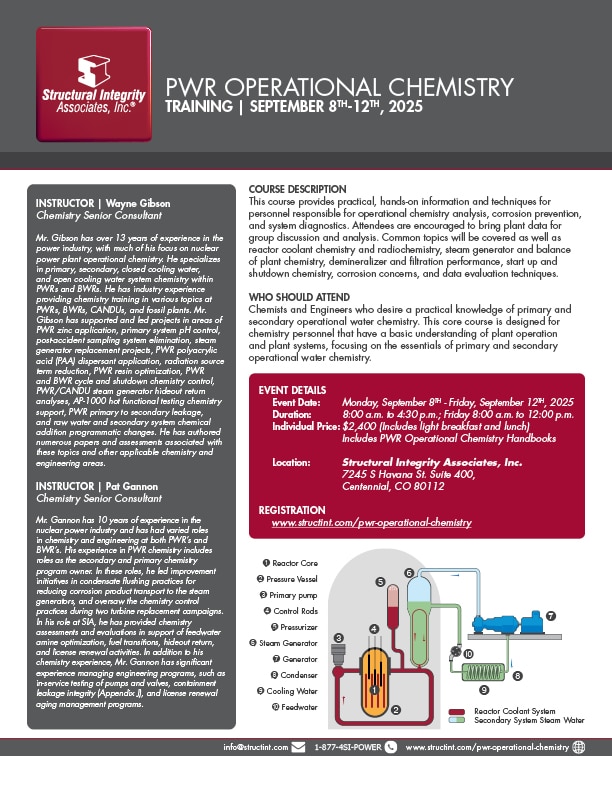EVENT DETAILS
Event Date
Monday, September 8th – Friday, September 12th, 2025
Duration
8:00 a.m. to 4:30 p.m.; Friday 8:00 a.m. to 12:00 p.m.
Individual Price
$2,400 (Includes light breakfast and lunch) Includes PWR Operational Chemistry Handbooks
Location
Structural Integrity Associates, Inc.
7245 S Havana St. Suite 400,
Centennial, CO 80112
INSTRUCTORS
Wayne Gibson
Chemistry Senior Consultant
Mr. Gibson has over 13 years of experience in the power industry, with much of his focus on nuclear power plant operational chemistry. He specializes in primary, secondary, closed cooling water, and open cooling water system chemistry within PWRs and BWRs. He has industry experience providing chemistry training in various topics at PWRs, BWRs, CANDUs, and fossil plants. Mr. Gibson has supported and led projects in areas of PWR zinc application, primary system pH control, post-accident sampling system elimination, steam generator replacement projects, PWR polyacrylic acid (PAA) dispersant application, radiation source term reduction, PWR resin optimization, PWR and BWR cycle and shutdown chemistry control, PWR/CANDU steam generator hideout return analyses, AP-1000 hot functional testing chemistry support, PWR primary to secondary leakage, and raw water and secondary system chemical addition programmatic changes. He has authored numerous papers and assessments associated with these topics and other applicable chemistry and engineering areas.
Pat Gannon
Chemistry Senior Consultant
Mr. Gannon has 10 years of experience in the nuclear power industry and has had varied roles in chemistry and engineering at both PWR’s and BWR’s. His experience in PWR chemistry includes roles as the secondary and primary chemistry program owner. In these roles, he led improvement initiatives in condensate flushing practices for reducing corrosion product transport to the steam generators, and oversaw the chemistry control practices during two turbine replacement campaigns. In his role at SIA, he has provided chemistry assessments and evaluations in support of feedwater amine optimization, fuel transitions, hideout return, and license renewal activities. In addition to his chemistry experience, Mr. Gannon has significant experience managing engineering programs, such as in-service testing of pumps and valves, containment leakage integrity (Appendix J), and license renewal aging management programs.
COURSE DESCRIPTION
This course provides practical, hands-on information and techniques for personnel responsible for operational chemistry analysis, corrosion prevention, and system diagnostics. Attendees are encouraged to bring plant data for group discussion and analysis. Common topics will be covered as well as reactor coolant chemistry and radiochemistry, steam generator and balance of plant chemistry, demineralizer and filtration performance, start up and shutdown chemistry, corrosion concerns, and data evaluation techniques.
WHO SHOULD ATTEND
Chemists and Engineers who desire a practical knowledge of primary and secondary operational water chemistry. This core course is designed for chemistry personnel that have a basic understanding of plant operation and plant systems, focusing on the essentials of primary and secondary operational water chemistry.
COURSE TOPICS
- Radiochemistry fundamentals
- Primary system overview
- RCS metallurgy
- RCS corrosion mechanisms
- RCS chemistry environments
- EPRI guidelines and requirements for RCS chemistry
- Corrosion product formation
- RCS pH chemistry
- RCS oxygen and oxygen ingress sources as it relates to the transport of corrosion products
- Shutdown and Startup chemistry practices
- Fission products and activation products
- Distribution of fast and slow neutrons, fission yield, and fission decay chains
- Letdown System Clean up general flow and components
- Resin properties, structure, and performance evaluation
- Resin performance topics
- Decontamination factor and measurement
- Fuel defects, the types of defects, and effects on radionuclides
- Secondary system overview
- PWR steam generator corrosion and corrosion mechanisms
- Factors that influence corrosion
- Secondary cycle conditions and corrosion control
- Impurity influence on corrosion
- Water and steam properties as they relate to steam generation
- Steam Generator design characteristics
- Amines usage, properties of amines, and effects of amines within the system
- Water and steam cycle real time measurements
- Hideout and hideout returns occurrence, measurement, calculation, trending



